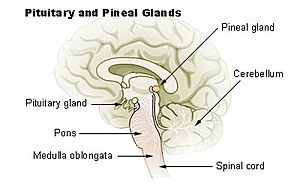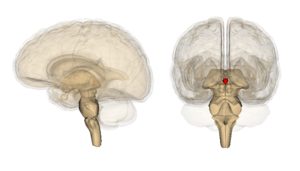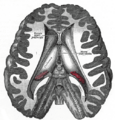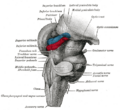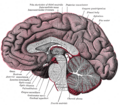Pineal gland facts for kids
The pineal gland is a tiny but important part of your brain. It's a special kind of gland called an endocrine gland. This means it makes and releases chemical messages, called hormones, directly into your blood. The main hormone it makes is called melatonin.
Melatonin is super important for your sleep. During the day, there's hardly any melatonin in your blood. But as evening comes, your pineal gland starts making more. This melatonin helps you feel sleepy and get ready for bed. It stays high in your blood all night while you're sleeping. In the morning, as light enters your eyes, the melatonin levels drop. This helps you wake up and feel alert.
Understanding Your Body Clock
Your body has a natural "clock" called the circadian rhythm. This clock tells your body when to be awake and when to sleep. It's usually set to a 24-hour cycle, like the day and night. The pineal gland and melatonin are key players in keeping this clock on time. They help your body know when it's time to rest.
When Sleep Patterns Change
Sometimes, a person's body clock doesn't work quite right. This can lead to circadian rhythm sleep disorders. One common one is called Delayed Sleep-Phase Disorder (DSPD). People with DSPD often feel sleepy much later than most people. For example, they might not feel tired until 3 in the morning or even later. But once they fall asleep, they usually get a normal amount of rest, often eight hours or more. Their body clock is just set to a later schedule.
Images for kids
-
Micrograph of a normal pineal gland – very high magnification
-
Micrograph of a normal pineal gland – intermediate magnification
-
Diagram by René Descartes showing how he thought the pineal gland worked
See also
 In Spanish: Glándula pineal para niños
In Spanish: Glándula pineal para niños


